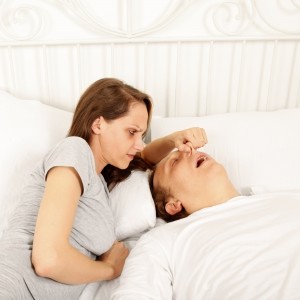I recently wrote an article about the strong links between sleep apnea and dementia. But hey–you’re only 45 and dementia is way too far away to worry about.
But what if sleep apnea was causing brain damage RIGHT NOW??
Let’s backtrack a little here and cover what sleep apnea really is. There are two basic types; central (caused by an inability to regulate breathing while asleep) and obstructive (caused by mechanical blockage in the back of the airway). You are probably familiar with obstructive sleep apnea and associate it with snoring and obesity. This is the type of sleep apnea that you can’t miss if you’re sleeping in the same room with someone who has obstructive sleep apnea. And, in more severe cases, you just have to be in the same zip code…
Central sleep apnea, however, is not thought of as much but it has a much more sinister plot. It is very closely associated with prediabetes. To put in more clearly, the prediabetic process is dangerous enough to your body to cause it to stop breathing at night. “But my doctor checked me for this and said I was fine,” is not going to cut it anymore.
The key to both of the sleep apneas is simple; manage the condition short-term with a CPAP or BiPAP but eliminate sleep apnea long-term through appropriate lifestyle changes that are going to lead to weight loss and pulling away from the diabetes development track.
For those of you out there who THINK you may have sleep apnea but you are afraid to find out (via a sleep study)–you are probably making the biggest health mistake of your life. Sleep apnea is devastating for your health. It is an extreme stress on your body and brain that WILL shorten your life. And the answer (CPAP), while a wee bit of a hassle, is non-drug, non-addicting and can have a major impact on your daily life.
On a side note, for those of you who snore but do NOT have sleep apnea, there have been concerns over the past few years on the relationship between snoring and later heart disease. This means you are not off the hook for making the aforementioned lifestyle changes.
Back to this particular study. In it, researchers looked at 8,059 Hispanics aged 45 to 74 years, to see if there were relationshiops between brain testing (specifically, neurocognitive scores were measured using Word Fluency Test, the Brief–Spanish English Verbal Learning Test, and Digit Symbol Substitution Test) and obstructive sleep apnea. The sleep apnea was graded based on the Apnea-Hypopnea Index (AHI), or how many times the patient stopped breathing in an average hour of sleep. Normal is consider none to 4 episodes per hour. Here’s what they found:
- The mean AHI was 9.0 (this means that, on average, everyone in the study had some degree of sleep apnea).
- As the AHI number got higher, the female patients scored worse on all 4 of the brain-based tests.
The bottom line is that there are clear associations between sleep apnea and damage to the brain as demonstrated in these tests. If you even remotely think that you may have sleep apnea, you need to have this fully evaluated at a sleep center or at home with a home sleep-study kit (not as good for other sleep disorders, but is pretty good for identifying sleep apnea).
And, if you have a CPAP machine collecting dust on the nightstand, it’s time to dust it off and start using it. Your brain will thank you.

